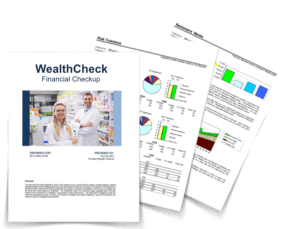I don’t know about you, but I’m excited for 2018.
No, it’s not because I’m predicting another boom year in the stock market. (Nobody can predict the stock market). It’s because I see a lot of opportunities in 2018.
In fact, I have five sure-fire ways to help you save thousands of dollars this year!
Interested? Keep reading…
Plan for a Successful 2018!
As a financial advisor in Ontario, I work with many pharmacists and their families. So I know what’s working (and what’s not working) for this group.
In my work, I always follow a simple but powerful formula:
Plan. Build. Protect.
It’s no accident that “Plan” comes first in the equation. Planning is actually the most important part of the entire process.
Once you have a plan, it’s easy to see what needs to be done. The next two steps (Build and Protect) are basically the execution of the items identified in the plan.
It’s already been a busy year for me. I’ve already completed several client plans in 2018. And you know what? I’ve noticed a few opportunities.
Here’s the best part: I’m going to share with you the top five opportunities I’ve discovered!

And don’t worry. None of these tips are hard to achieve. So you don’t need to do anything drastic, like cutting out restaurants for the rest of the year.
In fact, many of these tips are small by themselves. But when you combine a few of them, the impact is impressive. It’s compounding at its finest! (I’m talking the money compounding, not the pharmacy type 😉 )

I’ve tried to include something for everyone in the pharmacist community.
So whether you’re an intern just starting your career, or a pharmacist who’s close to retirement, these 5 pro tips will help you save thousands of dollars in 2018.
1) Stop paying more taxes than you need to
Tax is always the biggest opportunity for pharmacists. Taxes are by far your biggest expense. So a little tax planning can save you thousands of dollars in 2018.
As I’ve mentioned before, our tax system is not a level playing field.
For example, nobody from the tax department will correct you if you miss a deduction in your favor. But your tax return will get reassessed immediately if you miss reporting all your income. (You’ll also get a nasty interest penalty for good measure.)
Every year I find tax credits and deductions that clients miss. Some of these items are worth thousands of dollars in tax savings.
The good news is that clients can usually recoup these tax savings by filing out a simple tax form, called a T1 Adjustment.
(Programming Note: There’s lots of changes for the 2017 tax year. Like always, we’ll send out a special tax update closer to tax time. Stay tuned for that!)
2) Lower your investment fees
Competition brings prices down. (Heck, pharmacy is one of the most competitive professions out there, so I don’t need to tell you that!)
But what about your investment fees? Are they coming down?
Competition, new products (like ETFs) and technology are all driving investment costs down. And when it comes to investing, costs matter.
For example, cutting your investment fee by half a percent (50 basis points) will save $1000 per year on a $200,000 portfolio.
So how do you get your investment fees down? Great question.
Lower investment fees don’t happen automatically. The key is to shop around, or work with an advisor who can shop around for you.
Just keep in mind: Some financial advisors are limited to what they can offer (i.e. some bank advisors can only offer bank products).
Independent financial advisors have access to a wide variety of suppliers, and can shop around to get you the best solution for the best price.
3) Grab that free money
Are you leaving money on the table? It happens more often than you think.
The two most common “free money” opportunities for pharmacists are employer investment matching and government benefit programs.
Many employers offer investment programs (i.e. group RRSPs, stock purchase plans). To encourage employees to participate, most programs offer some type of employer match (aka “free money”).
The government offers free money, too. The new Child Care Benefit (CCB) offers tax-free money for families with children under the age of 18.
Also, parents saving for a child’s education have access to federal grant money. For example, if your child was born in 2017 or earlier, you can get $1000 in education grant money by opening a new RESP and depositing $4000.

4) Trim your interest costs by reorganizing your debts
Most Canadians have more than one type of debt. The most common debts are mortgages, car loans and credit card balances.
It’s important to note that not all debt is created equal. So there’s an opportunity to save money by reorganizing your debt.
Start by looking at your high interest debt, like credit cards. Most banks are willing to offer pharmacists a line of credit. Lines of credit have much lower interest rates compared to credit cards. So it makes sense to pay off credit card balances with lines of credit.
In some cases, you can make your debt tax deductible. This involves liquidating some of your assets and repurchasing them with borrowed money. (However, this opportunity is complex. So make sure to consult a professional to explore this option).
5) Cut your life insurance costs
Let’s face it, life insurance is confusing.
But you can save big bucks if you can learn the basics. In a nutshell, life insurance comes in two varieties: term and permanent.
Term life insurance is used to cover temporary needs, like a mortgage that will be paid off. Permanent life insurance is used to cover permanent needs, like funeral and estate costs.
Term life insurance is much cheaper than permanent life insurance, so make sure to use term for all your temporary needs.
Also, make sure to get quotes for a new term life policy before the anniversary date of your existing policy. Most term policies will cover you after their first anniversary date, but at much higher rates.
For example, a term 10 policy will generally cover you after the ten year anniversary date. But the renewal rates are usually much higher than what a new policy might offer.
Again, shopping around is key. A life insurance broker has access to many insurance companies, so they can get compare quotes to get you the best price.
Conclusion
Compounding is a wonderful thing. By doing several small things right, you can accomplish great things. That’s the secret to making 2018 your most successful year ever.

About the Author:
Paul Carvalho helps pharmacists in Canada with investments, life insurance and retirement planning. He has a Bachelors Degree in Economics, a Masters Degree in Business Economics, and has earned the Chartered Financial Analysis (CFA) designation.
Want to get your finances on track? Request your Wealth Check today!





